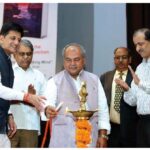ON September 18, four Pakistani terrorists carried out with military precision what has come to be viewed as one of the worst terrorist attacks on the Indian Army. They killed 19 army jawans and injured over two dozens of them in Jammu and Kashmir’s Uri sector, in the rear office of an Indian Army infantry brigade installation. Since then, India upped its diplomatic offensive against Pakistan in a bid to isolate the country internationally. “We will isolate Pakistan in the whole world and force it into eking out a solitary existence,” thundered Prime Minister Narendra Modi in an outburst of extreme anger.
Seething with anger at the demise of its soldiers in an unprovoked attack, the India Army warned on September 19 that it reserved the right to respond to any cross-border terror attack “at the time and place of our own choosing”. It squarely blamed a Pakistan-based terror outfit Jaish-e-Mohammed (JeM) for executing the murderous attack. The Army also said it has the desired capability to respond to any blatant acts of aggression and violence as deemed appropriate by us.
The remarks by Director-General of Military Operations, Lt Gen Ranbir Singh, came at a time when some security experts and political leaders had openly called for targeting terror camps in Pakistan-occupied Kashmir (PoK) after the attack.

“The Indian Army has displayed considerable restraint while handling the terrorist situation both along the Line of Control and in the hinterland. However, we have the desired capability to respond to such blatant acts of aggression and violence as deemed appropriate by us,” Lt Gen Singh said in a statement to the media at the South Block.
“We reserve the right to respond to any act of the adversary at the time and place of our own choosing,” he added. Lt Gen Singh’s remark was identical to the statement given by then Army chief Gen Bikram Singh in 2013 after the January 8 violation of the Line of Control (LoC) in which one jawan was beheaded and the other had his throat slit. “We’ll give them a fitting reply…we will respond at a time and place of our choosing,” he had said.
Following the Pathankot attack earlier this year, Defence Minister Manohar Parrikar had also said the same.
However, top Army sources said that action will be taken but nature and timing of it will not be revealed at the moment.
“There should be an element of surprise which is not there at the moment as Pakistan will be prepared for retaliation. The Indian Army, of course, has its strategy in place and will do its job,” the sources said.
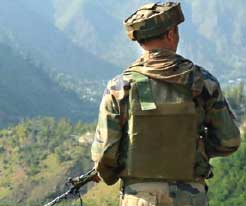
AS the public opinion calling for blood intensified, the government was left with no option but to let the Indian Armed Forces conduct overnight surgical strikes along the Line of Control in Pakistan on September 28-29. The surgical strikes targeted seven terror launch pads across LoC using heli-borne and ground forces. Addressing a press conference, Lt Gen Singh said India inflicted “significant casualties” on terrorists and those who were trying to support them. All Indian leaders, across party lines, hailed the Army for successfully executing surgical strikes and backed the Modi government’s decision as a befitting retaliation to Pakistan.
In a different situation, the country’s political leadership would have opted for the principle of plausible deniability. But such was the pressure from the public that the government confirmed that surgical strikes were conducted along the LoC to safeguard our nation. “Significant casualties have been caused to terrorists and those trying to shield them. We don’t have a plan to further conduct such strikes. India has spoken to Pakistan,” Lt Gen Singh said on September 29.
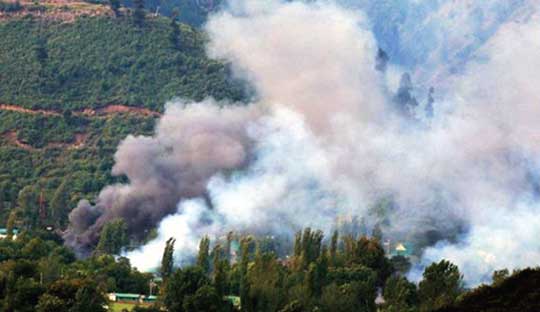
However, Pakistan dismissed India’s claim of the surgical strike and termed it as a “quest” by its eastern neighbour to create media hype by re-branding cross-border fire that killed their two soldiers, as a surgical strike. In a statement, Pakistan Defence Minister Khawaja Asif said on September 29, “The Pakistani Army gave a befitting response to the Indian army. Indian Army opened up small arms fire last night on five sectors across LoC. India is doing this under a well-planned objective. If India tries to do this again, we will respond forcefully. India is doing this only to please their media and public.” Pakistan Prime Minister Nawaz Sharif “strongly condemned the unprovoked and naked aggression of Indian forces resulting in the martyrdom of two Pakistan soldiers along LoC.”
Before the surgical strike was carried out, India had intensified its diplomatic efforts in the UN and elsewhere. Responding to Pakistani PM Nawaz Sharif’s incoherent speech on Kashmir describing terrorist Burhan Wani as a freedom fighter, India, under a right to reply, fielded a young first secretary whose crisp and brief statement became the most popular trend on social media as soon as it was made. Describing the Pakistan PM’s speech as “a long tirade” during the General Debate of the 71st session UN General Assembly on September 21, she attacked Pakistan on the topic of sponsorship of terrorism. The words used were less diplomatic, but definitely no less impactful.
“The land of Taxila, one of the greatest learning centres of ancient times, is now host to the Ivy League of terrorism. It attracts aspirants and apprentices from all over the world. The effects of its toxic curriculum are felt across the globe,” she said during her speech.
External Affairs Minister Sushma Swaraj, in her UNGA address on September 24, said that Sharif, who had accused India of human rights violations at the UN a week earlier, was heading a government that had carried out air attacks against its own people. “The brutality against the Baloch people represents the worst form of State oppression,” she said, referring to the ethnic minority in Pakistan.
The war of words heated up outside the UNGA, too. As Pakistani army carried out war drills inside the country and cancelled leave of its personnel, its Defence Minister Khawaja Asif went ballistic: “We will destroy India if it dares to impose war on us. Pakistan army is fully prepared to answer any misadventure of India… We have not made the atomic device display in a showcase. If such a situation arises we will use it and eliminate India,” Asif told TV channel Samaa when asked about India’s intent to launch a surgical strike on the country.
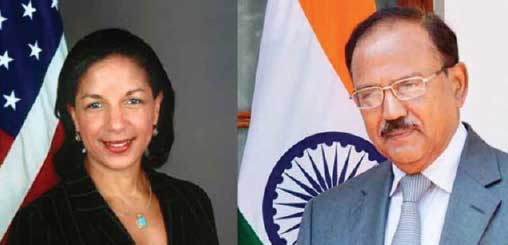
EVEN as India’s military operation got underway, the government was working the phones to manage the diplomatic fallout of the LoC strikes in PoK. The first call between National Security Adviser (NSA) Ajit Doval and US NSA Susan Rice took place at about 8:30 pm on September 28. While officials refused to confirm whether the NSA informed Ms Rice of the exact nature of the operation, their conversation put to rest two questions: India made it clear that it did not intend to escalate it to a conflict even if it launched “pre-emptive” counter-terror strikes, and according to senior government officials, the US didn’t intend to restrain India in any way. Mr Doval’s call followed two calls by US Secretary of State John Kerry to External Affairs Minister Sushma Swaraj in the second fortnight of September to discuss the situation.
11 major attacks on security forces in J&K since 2014
IN the deadliest attack on the Army in Jammu and Kashmir, heavily armed militants stormed a battalion headquarters of the Army in North Kashmir’s Uri town in the wee hours September 18, killing 19 jawans and injuring 20 other personnel.
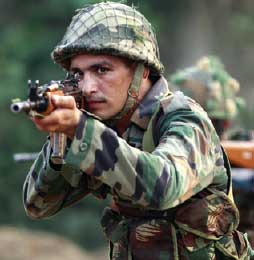
The following is a timeline of major attacks that have taken place in Jammu and Kashmir since 1999 till date.
June 25, 2016: Eight CRPF personnel were killed and 20 others injured when militants attacked their convoy at Frestbal near Pampore on Srinagar-Jammu National Highway.
February 21, 2016: Three army commandos, including two Captains, and a militant were killed in a fierce gunfight with a group of terrorists holed up inside a government building on the outskirts of Srinagar.
December 7, 2015: Six CRPF personnel were injured when militants opened fire on their convoy near Green Tunnel at Samthan, in Bijbehara in South Kashmir’s Anantnag District.
November 25, 2015: Three JeM militants and a generator operator of MES were killed when a group of militants attacked an Army camp near LoC, at Tanghdar in North Kashmir’s Kupwara District.
November 18, 2015: A Colonel with the Army’s elite para commando unit was killed in an encounter with militants in the forests of Kupwara.
May 31, 2015: Army foiled attack on its Brigade headquarters in Tanghdar sector of Kupwara District by killing four members of six heavily armed militants.
March 21, 2015: Two terrorists were killed during a fidayeen attack at the Army camp on Jammu-Pathankot National Highway in Samba District. Three persons, including one civilian, a Major and an Army jawan were also injured in the attack.
March 20, 2015: A fidayeen squad of militants in army fatigues stormed a police station in Kathua District killing seven persons, including three SF personnel, two civilians and two militants, while 12 persons, including eight CRPF personnel, three policemen and a civilian were also injured in the incident.
December 5, 2014: A group of heavily armed militants stormed into an Army’s 31 Field Regiment Ordinance Camp at Mohra, in Uri Sector of Baramulla District, near the LoC.
One Lieutenant Colonel and seven soldiers of the Army, one ASI and two constables of J&K Police were killed. Six militants were also killed in the operation.
November 27, 2014: 10 persons, including four civilians, three army soldiers and three militants were killed in a day-long encounter at the border village of Kathaar in Arnia sector of Jammu District.
September 26, 2013: At least 13 killed in twin suicide attacks in Jammu and Kashmir. The dead included four policemen and two civilians in Kathua District and four Army personnel, including Lieutenant Colonel Bikramjeet Singh, in Samba District.
June 24, 2013: Eight soldiers killed in an attack on a military convoy at Hyderpora, Srinagar.
March 31, 2013: Attack on CRPF camp in Srinagar results in five deaths.
October 5, 2006: Terrorists attack at Budshah Chowk, in heart of Srinagar, killing five JKP personnel, two CRPF soldiers and one civilian.
April 6, 2005: A day before the bus from Srinagar to Muzaffarabad in PoK is to be flagged off, two suicide squads of terrorists attack the Tourist Reception Centre.
July 22, 2003: A three-member team storms an army camp, killing eight security force personnel, including a Brigadier, and injuring 12 others in Akhnoor.
May 14, 2002: 36 persons are killed and 48 others injured in a fidayeen attack on an army cantonment in Kaluchak, Jammu.
November 3, 1999: Ten army personnel killed in a fidayeen attack on 15 Corps Headquarters at Srinagar’s Badami Bagh.
Hours after the surgical strike, the government on September 29 went to work, explaining its actions to other countries as well. Foreign Secretary S Jaishankar held a briefing for envoys of 22 countries, including the P-5 (Permanent members of the Security Council—US, UK, Russia, China, France), Germany, Japan, and key neighbouring countries and West Asian countries about the developments. A separate briefing was held for former Indian diplomats, retired officials and think-tank analysts who will take forward the government’s stand on public platforms and the media.
THE government explained to foreign diplomats that even before the Uri attacks, the government had brought to Pakistan’s notice the increasing number of infiltration attempts across the LoC, counting at least 19 attempts and several planned attacks in the past two months. “Each time we were met with condescension and denial,” an official is believed to have said at one of the several briefings.
In the week after the Uri attack, the Foreign Secretary had called in Pakistan High Commissioner Abdul Basit twice. On both occasions, India had offered fingerprints and other details of the attackers so Pakistan could try and identify them. However, the offer was met with no reply.
When asked about the threat of sparking a full-fledged conflict with Pakistan, the official is believed to have said, “Fear of escalation cannot be a reason for passively accepting acts of violence.” But, he added that India had no desire to conduct further operations.
Contrary to Pakistan’s assertion, China on September 29 signalled that it was actively engaged in defusing tensions between India and Pakistan, using multiple channels, to prevent a spillover of friction between New Delhi and Islamabad in the region. “As for the tension between Pakistan and India, recently Chinese side has been in communication with both sides through different channels,” Chinese Foreign Ministry spokesman Geng Shuang told a media briefing in Beijing.
He added: “We hope that Indian and Pakistan can enhance communication and properly deal with differences and work jointly to maintain peace and security in the region.” Geng was responding to questions on whether the attack in Uri featured during the maiden counter-terrorism and security dialogue that was held between India and China earlier this week.
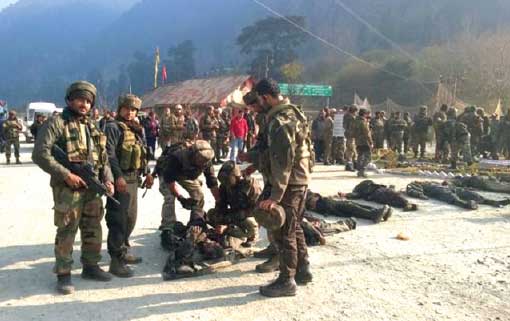
“China is a friendly neighbour to India and Pakistan. China hopes that both the countries could properly deal with their differences (through) dialogue and consultation and improve their bilateral relationship, strengthen cooperation in different fields and work jointly for regional peace and development and stability,” he observed.
Earlier on September 28, China’s Deputy Foreign Minister Liu Zhenmin told Pakistan’s special envoy to China for Kashmir that Beijing “hopes that Pakistan and India will strengthen channels for dialogue, appropriately handle any differences, improve bilateral relations and together protect the region’s peace and stability.”
Will Pak Army chief leave or get an extension?
by MK Shukla
THE surgical strike by the Indian Army across the LoC on the night of September 28-29 might have rendered a big blow to the reputation of incumbent Pakistan chief of the Army staff, Raheel Sharif. There are equal chances of his vacating the office in November when his term ends, or hanging on to office till he has avenged the blow to his vanity/honour rendered by the Indian surgical strike. Whether Raheel Sharif hangs to the office or someone else replaces him, one thing is sure, Prime Minister Nawaz Sharif can never be sure of the army he is supposed to command, even though he is credited with appointing the maximum number of COAS in Pakistan Army.
May it be noted that General Sharif is immensely popular among ordinary Pakistanis, who see him as a bulwark against crime, corruption and Islamist militant violence. He has also strengthened the military’s grip over aspects of the government, including the judiciary and areas of security policy. Yet the military flatly rejects the possibility of an extension.
“I will request you to avoid speculation because we have already taken a position very clearly,” Lieutenant General Asim Bajwa, the army’s main spokesman, told a press briefing recently.
In a country prone to military coups, including one in which Sharif himself was ousted from power in 1999, suspicions that the General will remain in his post persist, including among some of the prime minister’s senior aides.
“Army chiefs soon begin to think they are invincibles-in-chief,” said a close aide to Sharif, requesting anonymity as he was not authorised to speak about military appointments.
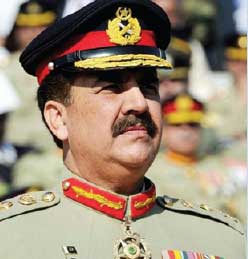
What happens at the top of Pakistan’s armed forces will be closely watched overseas.
According to media reports, the military high command has sent to the prime minister the dossiers of four main contenders. If PM Sharif rejects the ‘apna banda’ approach and follows the universal principle of seniority, his choices are more or less well defined. Chief of General Staff Lt Gen Zubair Hayat is considered in Pakistan’s military hierarchy as the senior-most, followed by Multan Corps Commander Lt Gen Ishfaq Nadeem Ahmed, Bahawalpur Corps Commander Lt Gen Javed Iqbal Ramday and Inspector General of Training and Evaluation Lt Gen Qamar Javed Bajwa. These four generals are from the 62nd Pakistan Military Academy (PMA) Long Course.
The premier’s favourite is said to be Ramday, commander of the XXXI Corps who led a 2009 operation to drive the Pakistani Taliban militant movement from Swat Valley near the Afghan border.
The three other dossiers are for Lt Gen Zubair Hayat, Chief of General Staff, Lt Gen Ishfaq Nadeem Ahmad, commanding officer in the western city of Multan, and Lt Gen Qamar Javed Bajwa, who heads the army’s Training and Evaluation Wing.
Ramday is considered among the front-runners, in part because his family has been associated with Sharif’s Pakistan Muslim League (PMLN) party for many years. He is also seen by some security officials as popular with General Sharif. “He’s perhaps as liked by Raheel Sharif as he is by Nawaz Sharif,” said a senior security official based in Islamabad, declining to be named.
Hayat oversees intelligence and operational affairs at the army’s General Headquarters and, before that, headed the Strategic Plans Division (SPD), which is responsible for Pakistan’s nuclear programme. Retired and serving officers who have served with Hayat see him as a compromise between the military and civilian government.
Ahmad has extensive experience with military operations, especially against Pakistan’s Taliban insurgency, and was previously the Director-General Military Operations. Several past army chiefs had served as DGMOs before being promoted to the top post.
The last candidate, Lt Gen Qamar Javed Bajwa, is seen as Pakistan’s best bet to improve ties with India as he is said to view extremism as a bigger threat to Pakistan than India. Currently, he is serving at the GHQ as Inspector General of Training and Evaluation—the position Gen Sharif held before becoming army chief. He commanded the 10 Corps, the army’s largest, which is responsible for the area along the Line of Control (LoC). He also has extensive experience of handling affairs in Kashmir and the northern areas of the country. As a major general, he led the Force Command Northern Areas. He also served in the 10 Corps as a Lieutenant Colonel, where he was GSO. He has served with a UN mission in Congo as a Brigade Commander alongside former Indian army chief Gen Bikram Singh, who was also there as a Division Commander. He was also the commandant of the Infantry School in Quetta.
Media reports suggest he is not an attention seeker and remains well-connected with his troops. He is from the infantry’s Baloch Regiment. Three former officers of his Regiment have risen to be army chief—Gen Yahya Khan, Gen Aslam Beg, and Gen Kayani. His appointment as COAS could also help contain the tide of mounting insurgency in Pakistan’s largest and most restive province.
India was expected in the last days of September to step up its diplomatic offensive, reaching out to all countries who have viewed the rising tensions at the LoC with concern. In early October, Sri Lankan Prime Minister Ranil Wickremesinghe as well as Singapore Prime Minister Lee Hsien Loong are scheduled to visit Delhi. At least 10 heads of State and the government would attend the BRICS summit in mid-October in Goa, including Chinese President Xi Jinping, Russian President Putin, Bangladesh Premier Sheikh Hasina and Myanmar Foreign Minister Aung San Suu Kyi.
New Delhi has already received support on its move to pull out of the SAARC summit in Pakistan from Afghanistan, Bhutan and Bangladesh. On September 28, Bangladesh officials said they backed India’s action across the LoC. “India has all legal and globally accepted rights to respond to any attack on her sovereignty and territory,” said Iqbal Chowdhury, advisor to Bangladesh Prime Minister Sheikh Hasina, adding that “Bangladesh always feels that in these type of things, there should be restraint from all sides.”
INDIA’S surgical strike also received the tacit support of the US. On September 30, Washington made clear its support for India’s surgical strike across LoC to take out terrorist launch pads and camps. But a State Department spokesman, John Kirby, refused to entertain question if there was any cooperation between India and the US on the latest Indian operation. “I don’t have a specific laundry list here to read out to you because, frankly, it’s something that we’ve been constantly working at with our partners in the region,” he replied enigmatically.
Counter-terrorism cooperation, he said, is something that the US is always working at with its partners in the region. “We’re always trying to get better at combating terrorism in the region. There are many ways you can do that, you know, through information sharing regimens and increasing communication between all parties involved,” he said.
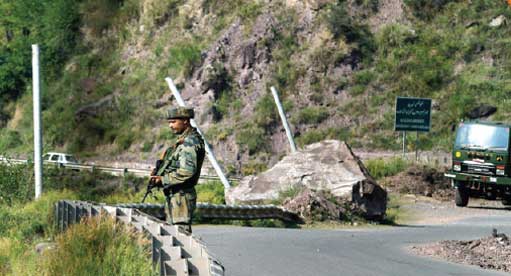
“Obviously, an (terrorist) attack like that (in Uri) escalates tensions. What I don’t want to do is try to get into, you know, some sort of broad characterisation one way or the other, but obviously an attack like this is horrific…”, he told reporters in Washington on September 29.
He said the US has called for action to combat terrorist groups like JeM and LeT and Haqqani network. He added that while Washington was closely monitoring the situation on the LoC, “We’ve repeatedly expressed our concerns regarding the danger that terrorism poses to the region.”
Kirby also said that US Secretary of State John Kerry had spoken to Minister of External Affairs on September 27 and “reiterated his strong condemnation of the Septem-ber 18 Uri terror attack.” “He (John Kerry) condemned terrorism in all its forms and cautioned against any escalation in tensions,” Kirby said.
























































